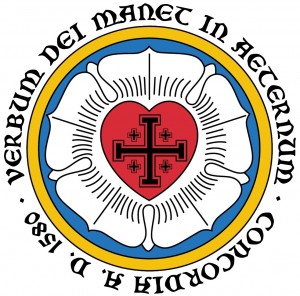Desiring to remain faithful to our Lord and to the historic doctrine and practice of confessional Lutheranism, the Voters’ Assembly elected to secede from the LCMS on January 11, 2009.
Our congregation is now affiliated with the Evangelical Lutheran Diocese of North America.
The Evangelical Lutheran Diocese of North America
(Taken from the ELDoNA tri-fold pamphlet. For a printable PDF version click here.)
Should Lutherans apologize for the Reformation?
A lot of modern “Lutherans” seem to think so. In America, many “Lutherans” appear to want to be something else, and so they adopt the worship services of the Baptists or Pentecostals and are disinterested in biblical theology. Others weaken the doctrine even further, claiming that they are now agreed with the Roman Church concerning the doctrine of Justification. Others abandon any pretense of standing on the foundation of God’s holy Word, teaching the lie of theological liberalism which only views the Bible as one more man-made book of human “wisdom.”
In practice, the name “Lutheran” is reduced to some sort of ‘brand preference’ or they think of the Church as simply one more ‘denomination’ among many. Many of the clergy seem to wish they were something else—and wish that the Church would be more like the Protestants or even Eastern Orthodoxy. Given such a surrender of Lutheran teaching and practice, such individuals seem bent on apologizing for the Lutheran Reformation.
We reject all such compromises. We believe it is time to be:
Lutheran—without apologies or excuses.
The Pastors of the Evangelical Lutheran Diocese of North America (ELDoNA) reject any such surrender of Lutheran doctrine and practice. They believe that it is far past time for the Evangelical Lutheran Church to stand steadfast on the foundation of God’s Word, and to boldly confess that faithful exposition of Holy Scripture which is found in the Book of Concord (1580).
What is the Evangelical Lutheran Diocese of North America?
First of all, we are truly “Evangelical Lutheran”; that is to say, we are committed to teach and do that which is in complete harmony with what is taught in the Lutheran Confessions, the Book of Concord (1580).
What is a “diocese”?
A “diocese” is simply an area of administration. The term is derived from a Greek word which means “to keep house,” or “to administer.” Such an area of “administration” is overseen by an “administrator,” which we, following the received tradition of the Church throughout the ages, refer to as “Superintendent” or “Bishop.” The use of the term “Bishop” goes back to the earliest days of the Church; the term “Superintendent” came into Lutheran usage in the 16th century to designate the same office and responsibilities.
What is the relationship of congregations to the diocese?
Strictly-speaking, only clergy are members of the diocese; a congregation served by a pastor of our diocese remains ‘independent’ of any ecclesiastical structure, and is directly under the spiritual leadership of the pastor whom the Lord has called to serve in that place. We do require that a congregation which is served by a pastor of our diocese does not itself hold membership in a ‘synod’ which is not in fellowship with the ELDoNA.
Does a congregation “join” the diocese?
No. Congregations served by pastors of our diocese are not themselves “members” of the diocese; the diocese makes no claims upon the property, etc. of congregations served by pastors of our diocese. Congregations which are seeking to call a pastor are welcome to consult the Superintendent/Bishop, but he will not seek to impose a pastor on a congregation. Any congregation which is served by a pastor of the diocese may refer to itself as “affiliated” with the ELDoNA. It is hoped that congregations will financially assist mission congregations affiliated with the diocese, as well as engage in joint activities, including support of a seminary to train future pastors.
What are the responsibilities of the Superintendent/Bishop?
The terms “Superintendent” and “Bishop” are derived from Latin (superintendo) and Greek (episcopeo) words which mean “to oversee.” Therefore, a Superintendent/Bishop is one who “oversees” the diocese: he is responsible for overseeing the admission of pastors into the diocese, and, if necessary, the removal of pastors from the diocese; he is responsible for conducting visitations of pastors; he offers fraternal guidance to members of the diocese to encourage their unity in doctrine and practice; normally he will ordain candidates for the ministry, and install pastors of the diocese; and he chairs all synods and other meetings of the diocese.
How does a Pastor join the ELDoNA?
First, he should visit our website (www.eldona.org) and read the documents “Niles Theses” and “Malone Theses” which address various contended issues which confront the Church.
Second, he should contact the Superintendent/Bishop expressing his intent, so that the diocese will have the opportunity to consider his application. The applicant should provide a history of his service in the holy ministry and should express in writing his agreement with the Niles and Malone Theses.
What obligations does a Pastor have toward the diocese?
Those which he took in his ordination vows with regard to his life, his doctrine, and his practice. He will also be expected to actively participate in study and mutual support of the brethren, and to assist (according to time and ability) in shared labors of the diocese, and consents to the administrative responsibilities of the Superintendent/Bishop.
A pastor may always resign his membership in the diocese; through such action he forfeits any further claim of affiliation, unless he is readmitted to the diocese in the future. If, on account of false doctrine or immoral life, a pastor is removed from the diocese, this does not terminate his call (such matters rest with the congregation).
How can our congregation call a Pastor of the diocese?
Please contact the Superintendent/Bishop and he will gladly assist you. We will also assist in the supporting of Lutherans who desire to start mission congregations.

Our Seal: As Evangelical Lutherans, we retain the “rose” of Dr. Martin Luther, which the Reformer created to summarize the central teaching of Justification. The Jerusalem Cross in the center of the rose signifies the five wounds of Christ. The words “Verbum Dei Manet in Aeternum” (“The Word of God endures Forever”) have been emblazed on Lutheran banners, shields and standards since the time of John the Steadfast (1468–1532), the Elector of Saxony, who stood with the Reformers at the time of the Augsburg Confession. “Concordia A.D. 1580” confesses that our teaching is that of all true Evangelical Lutherans across the generations.
The Evangelical Lutheran Diocese of North America (ELDoNA)
The Rev. James D. Heiser
Superintendent/Bishop
c/o Salem Lutheran Church, U.A.C.
718 HCR 3424 E
Malone, TX 76660
e-mail: hunnius@mac.com
fax: (254) 533-2357
phone: (254) 533-2330
www.eldona.org



